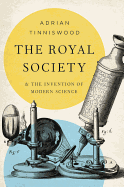
Adrian Tinniswood (Behind the Throne; The Long Weekend) provides an engaging history in The Royal Society and the Invention of Modern Science. In the 17th century, the Royal Society of London was founded by a dozen like-minded men, all interested in the nascent field of scientific research. They congregated less than 30 years after Galileo Galilei was hauled before the Inquisition for his belief that the world revolved around the sun. Its preceptors wanted to further their own scientific knowledge and disseminate these ideas as widely as possible. Although they were hidebound in some ways (the first woman was not admitted as a fellow until 1945), the Royal Society has been at the forefront of scientific investigation since 1660.
The Royal Society saw lows in the early years, such as poisoning animals for the sake of observation and a forced relocation after the Great Fire of London in 1666. But their highs included the chairmanship of Sir Isaac Newton and the commissioning of expeditions--three each to the Arctic, the Antarctic and Africa between 1819 and 1891. Nevertheless, its members always held true to the group's motto: Nullius in verba (Take no one's word for it). Their constant curiosity about the world around them has indisputably broadened the scope of scientific investigation for many years. Lovers of science and history alike will enjoy The Royal Society--this slim volume packs a wealth of entertaining information about these enterprising men and their research. --Jessica Howard, bookseller at Bookmans, Tucson, Ariz.

